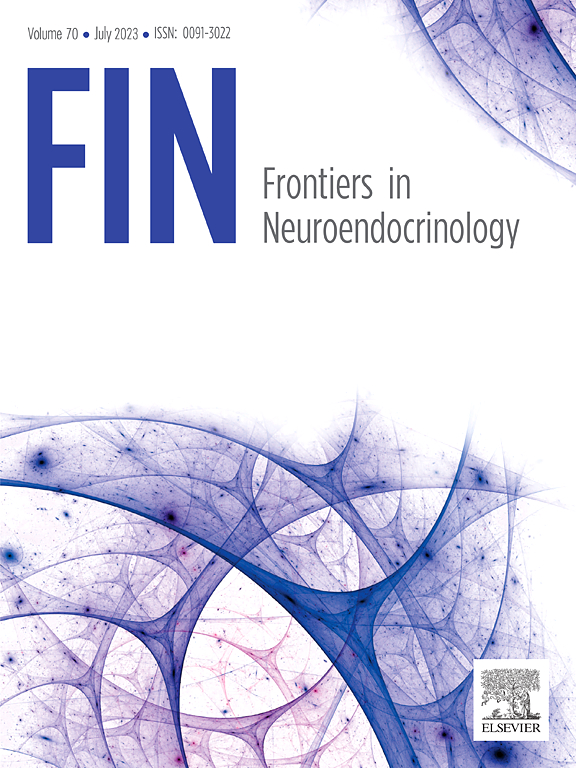Menstrually-related mood disorders and postpartum depression: Convergent aspects in aetiology
IF 6.7
1区 医学
Q1 ENDOCRINOLOGY & METABOLISM
引用次数: 0
Abstract
Females diagnosed with Menstrually-related mood disorders (MRMDs) have more risk to develop postpartum depression (PPD). There are overlapping symptoms between MRMDs and PPD such as anxiety, depressed mood, irritability, that can contribute to a lower quality of life. MRMDs and PPD share components in their etiology such as dramatic hormonal oscillations, and alterations in Hypothalamus-Pituitary-Adrenal (HPA) axis activity that may impair GABAergic neurotransmission. As well, stressful events that impact HPA regulation may play an important role in the etiology of MRMDs and PPD. Here we review common hormone fluctuations across the menstrual cycle and pregnancy/postpartum to identify shared pathways that could contribute to greater sensitivity in people with MRMDs and PPD. This review summarizes hormone sensitivity, HPA axis activity and neurosteroids effects on GABAergic transmission and the potential role of chronic stress in developing MRMDs and PPD. In addition, other potential etiopathological factors, such as serotonin and the immune system, are discussed. Investigating the etiopathology of MRMDs and PDD will help to better understand the complexity of factors involved in these disorders that affect females across the reproductive years.
月经相关情绪障碍和产后抑郁症:病因学的趋同方面。
患有月经相关情绪障碍(mrmd)的女性患产后抑郁症(PPD)的风险更高。mrmd和PPD之间存在重叠症状,如焦虑、抑郁情绪、易怒,导致生活质量低。mrmd和PPD在其病因上有共同的成分,如剧烈的激素振荡和下丘脑-垂体-肾上腺(HPA)轴活性的改变,这些改变可能损害gaba能神经传递。此外,影响HPA调节的应激事件可能在mrmd和PPD的病因学中发挥重要作用。在这里,我们回顾了整个月经周期和怀孕/产后常见的激素波动,以确定可能导致mrmd和PPD患者更敏感的共同途径。本文综述了激素敏感性、HPA轴活性和神经甾体对gaba能传递的影响以及慢性应激在mrmd和PPD发生中的潜在作用。此外,其他潜在的致病因素,如血清素和免疫系统,进行了讨论。研究mrmd和PDD的病因病理学将有助于更好地理解这些影响女性生育年龄的疾病所涉及的因素的复杂性。
本文章由计算机程序翻译,如有差异,请以英文原文为准。
求助全文
约1分钟内获得全文
求助全文
来源期刊

Frontiers in Neuroendocrinology
医学-内分泌学与代谢
CiteScore
13.30
自引率
6.80%
发文量
62
审稿时长
68 days
期刊介绍:
Frontiers in Neuroendocrinology (FIN) publishes a wide range of informative articles including comprehensive reviews, systematic reviews, opinion pieces, and meta-analyses. While the majority of reviews are invited, we also embrace unsolicited reviews and meta-analyses, as well as proposals for thematic special issues, provided they meet our rigorous quality standards. In addition, we encourage authors to submit commentaries that concisely present fresh ideas or offer further analysis to delve deeper into the implications of an article published in our journal.
 求助内容:
求助内容: 应助结果提醒方式:
应助结果提醒方式:


